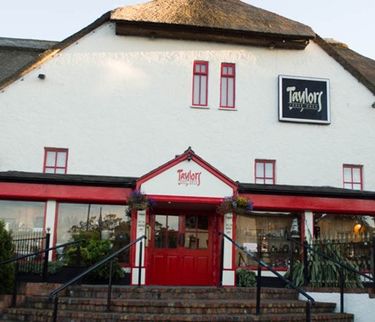
Mark Dietrich is Senior Advisor to the EGI Foundation, based in Amsterdam, and providing advanced research computing services to researchers across the EU and around the world, Mr. Dietrich specializes in European cloud strategy, the cloud-edge-IoT continuum, AI & HPC, data and infrastructure federations, the design and governance of data spaces and data ecosystems in industry and public good sectors such as healthcare, climate change and research. He brings decades of experience as an executive in the private sector, leading start-up organizations, raising venture capital and developing successful business models and go-to-market strategies.
Sessions in which Mark Dietrich participates
Thursday 23 June, 2022
Inform IoT and research community on the recent developments in Data Spaces widely defined as ecosystem for secure and sovereign data sharing that ensure interoperability at four layers: technical/infrastructure, semantic/metadata, organizational, and legal. Discuss benefits of Data Spaces concept and infrastructure for Research Data Management and Governance.Bring together and discuss form of cooperation between research data community and current Data Spaces community to develop t...
Sessions in which Mark Dietrich attends
Monday 20 June, 2022
This session will identify the high-level objectives of and challenges imposed by the EU Green Deal and key resulting Data policies; show IoT and Edge Computing business driven scenarios and use cases that can support these objectives and challenges in addressing key EU Green Deal and Data policies. It will also reflect on existing Environmental Footprint Methodologies and how this fit in the initiatives such as European Digital Green Coalitio...
The Internet of Things (IoT) is emerging as a powerful enabler in many application domains, such as water and energy management, environmental monitoring, health, smart cities, smart industry and supply chain management. The IoT has the potential to address some of the most acute human, economic and environmental needs. It can also directly contribute to achieving the targets in the Sustainable Development Goals (SDGs). In 2017, the IoTWeek held in Geneva, adopted ...
Nowadays, industries face tremendous challenges in the months and years ahead. Complex value chains, highly competitive markets, evolving customer and citizen needs, supply chain disruptions, foreign trade uncertainty, environmental sustainability and social impact, and now the COVID-19 pandemic are common challenges that organisations from every industry, from manufacturing to healthcare, energy, financial services, etc., deal with on a daily basis.
Tuesday 21 June, 2022
Building upon existing and rapidly evolving technologies and architectures in the field Big Data, IoT, continuum computing, Artificial Intelligence, HCI, etc, new paradigms have emerged such as the Web3.0, the Metaverse, and the Spatial Web. These new and complementary paradigms are moving at speed light from fantasy literature to reality, and probably opening a new thread of opportunities and challenges for existing and emerging industries and our society. How does these 3 terms/paradigms...
The Internet of Things (IoT) technologies are heavily interwoven within every-day present life and tomorrow will impact even more. Predicting the next global tendency but need in society is key to IoT development.In a new Post-COVID era, IoT is accelerating and facilitating new trends such as home working, new mobility challenges and the digitalization of the economy. It also becomes more necessary for redesigning the new global supply chain, foster the collaboration and generate ne...
The evolution of the IoT into the Next-generation IoT will be marked by a series of technological advances which includes contextually aware and distributed intelligence, federated services and microservices, integration of DLTs and smart contracts, and tactile and AR interfaces among others. It is typified by the convergence between the cloud and Edge along the human-cloud computing continuum and is underpinned by the functionalities afforded by 5G networks.&nb...
Quoting the United Nations: “to fully implement and monitor progress on the SDGs, decision makers need data and statistics that are accurate, timely, sufficiently disaggregated, relevant, accessible and easy to use.”When it comes to achieving the Sustainable Development Goals, there is only one correct possibility for public officials and economic leaders: to count on secure and reliable data as it may be the difference between takin...
The truzzt:box uses the on-chip-based Intel SGX:enclave to process and ship data in federated data spaces. It ensures the highest standards of confidential processing of any data, especially sensitive data, enabling and enhancing an integrated data exchange ecosystem that connects data providers and data consumers via hardware-based controls from the web to the edge to the device.
By exploiting the properties of quantum physics, quantum technologies represent a fundamental paradigm shift, and also a promising and rapidly growing industrial sector. Recent advancements in this field are staggering and pose new challenges. For examples, quantum sensors exist for a long time and can be used in almost all industry areas and applications; photonics are key technologies for implementation of quantum communicatio...
If you are interested in accessing a pan-European catalogue of data sets and data services as a user, if you want to join a federation of top data infrastructure providers in Europe as a hub, if you want to know how to deal with data interoperability when experimenting with data in cross-border environments, this is definitely your session.This session will bring a very attractive set of panelists with experience in running infrastru...
Wednesday 22 June, 2022
Pilot Demonstrators and Industrial Use Cases
This session will discuss major trends and dynamics of our world that are influencing the decision-making processes of companies. Europe is every time more digital, but some conditions that seemed stable, are not anymore. The pandemic, the war in Ukraine, climate change but also the advent of artificial intelligence, hyperconnectivity and other technologies are leading to a new playground that leaders have to manage.Intro: a view on glob...
The European Commission is preparing an Action Plan on the Digitalisation of Energy (DoEAP), to be published in autumn 2022. Digitalisation is a prerequisite and allows to the efficient and effective operation of the energy system and energy markets. The data includes metering data, data from consumers such as home appliances, building automation, EV charging stations, or prosumers PV panel & inverters. Its availabilit...
Technical Presentations for SMEs and Stakeholders in Data Marketplaces and Data Spaces
Chair: Antonio Fernando Skarmeta Gomez (University of Murcia, Spain) 11:00 Industry-Academia Cooperation: Applied IoT Research for SMEs in South-East Sweden Arslan Musaddiq,
Overall IoT and Edge Computing Standardisation ChallengesPolicy and Regulations on IoT and Edge ComputingSDOs on Solving IoT and Edge Computing Standardisation Challenges
Ecosystem building & Digital Innovation Hubs in European smart farming Interactive workshop tohighlight the importance of Digital Innovation Hubs as one-stop-shops for innovation services, helping lower innovation barriers and facilitating knowledge exchange. Challenges in ecosystem building in agritech will be addressed.
Data is seen as the modern oil for driving economy and indeed several major actors (global companies, rich countries) are working on strategies of how to define the evolving data space. It also seems to be agreed that we are in front of a huge transformation due to the ubiquitous digitisation in all domains of life – some call it the next revolution [1]. IoT is not only part of this transformation but one of its motors with its billions of smart ...
This session provides an opportunity for the AIOTI semantic expert group to discuss the role of ontologies in the context of the Green and Digital transformation with external stakeholders. We would like to start with an introduction to the Green and Digital transformation by the EC. Then provide an update about the activities in the AIOTI semantic expert group concerning ontologies (especially the Ontology landscape recently published), while sharing some e...
Business Models and Sustainability for Data Spaces and Marketplaces with Stakeholders Interaction
Rolf Riemenschneider (European Commission) – EU perspective challenges related to performing processing in the cloud. The need to move processing to the edge where possible for latency, energy efficiency, security reasons (alleviate load on the cloud). Michael Hayes (Tyndall National Institute) “Power IoT challenges and opportunities (related to IoT wireless edge devices)”
The SmartAgriHubs Innovation Portal Introduction of the updated SmartAgriHubs Innovation Portal, and how its features (Library, Network, Forum) encourage connections between the different stakeholders. Highlight exclusive tools developed by the project such as the Agricultural Technology Navigator (ATN). As the SmartAgriHubs project ends will end in October 2021, special attention will be paid to the legacy of...
This session focuses on standards related to IoT and Edge computing which enable the integration of data spaces. It will cover the following topics:Data space challengesData space standardisationInteroperable data spacesExample of energy data spacesThe move to the Far Edge will have huge economic potential by leveraging a local, distributed computing infrastructure, and it facilitates the creation of...
Óscar Lázaro10 'Introduction OPEN DEI Think TankMichela Magas10' Excellence in multilateral DVC Open Innovation Conduct: Towards an m-DVC Industry CommonsDaniel Saez Domingo10' (Dat...
The call topic “Future European platforms for the Edge: Meta Operating Systems” targeted for the next generation of higher-level (meta) operating systems for the smart IoT with strong computing capacity at the edge, embedded in a computing continuum from IoT-to-edge-to-cloud. Horizon Europe Cluster 4 projects are launched to strengthen European supply and value chains in cloud to edge computing by integrating relevant elements of computing, connectivity, IoT, AI...
Open Source and Engagement Networking
Taylors Three Rock - Traditional Irish PubWhat can be more Irish than an evening spent in a cosy traditional Irish pub! Nestled at the food of the Dublin Mountains, Taylors Three Rock is a fantastic venue for an informal conference party. Delegates will then be entertained by world champion Irish Dancers and famous Dublin traditional Irish musicians. This show is full of audience participation, delegates will be sing...
Thursday 23 June, 2022
Is your water fully digitalised? What could be the benefit of sharing water data? How can Artificial Intelligence help you manage your water? Can digitalisation ensure security? Why are interoperable solutions important? What is the current digitalisation state of the water sector and how it may change in the near future? During this session, the current digitalisation state and research of water management in urban areas will be described using the H2020 NAIADES project as basis. Joi...
Our daily life has become more and more digital, from the way we commute to work to how we watch a movie in the evening: a “digital society” that uses a wide range of Next Generation Internet applications. Ensuring safe and trustworthy technologies is a real challenge for research, which must deal with rapidly evolving requirements and heterogeneous features in a highly competitive environment.
Discuss and learn about data marketplaces, data models, standards, data governance and business models for data monetization.
Digital Platforms have a disruptive impact on industry value chains and organisations which are the providers and users of digital platforms. In order to take advantage of the opportunities and control the risks of change, innovative business models are needed to adapt the business and operational processes, redefining the customer journey and value proposition, discovering new channels and stakeholders engagement models, and creating innovati...
Availability of data for financial services is key to unleash the potential of Artificial Intelligence technologies: the INFINITECH project, lighthouse EU H2020 project, approaches application deployment by leveraging on testbeds and sandboxes. The session will explore the importance of data-driven AI for the financial sector by comparing the highly innovative and revolutionary world of Fintech companies with Financial Institutions, conservative and resistant to digital transformation and ...
